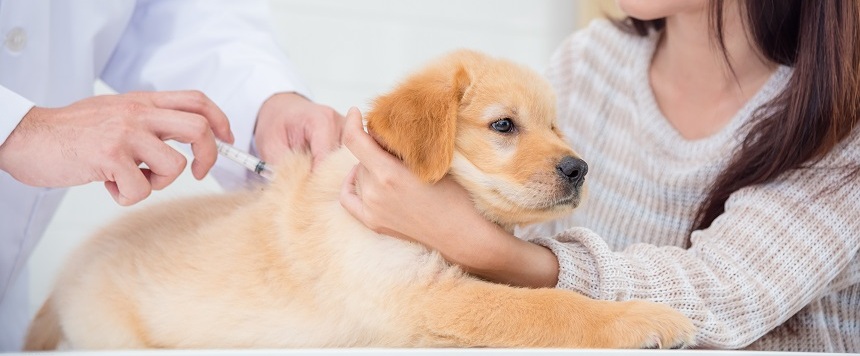🔥NEW🔥 PETHELP+ insurance is now available. Check here or call 📞 790 277 277
Rabies is an infectious viral disease that is dangerous to both animals and humans. Infection occurs through a bite, and the virus then enters the next organism through contact with the infected animal's saliva. It attacks muscles and nerves before reaching the brain, causing acute inflammation and eventually death. For this reason, it is a disease that requires a special control program worldwide. The mainstay of rabies prevention is vaccination of both domestic and wild animals, as well as humans in some cases. Cats, dogs, foxes, rodents, and bats are among the animals that can transmit rabies.
This service is available in Pethelp packages. Package prices start at 59 PLN/month
Check
Dogs must be vaccinated against rabies at the age of three months (12 weeks). A 3-month-old pet's owner is required to vaccinate his dog within 30 days. If the vaccination was given to a younger dog, it should be repeated at 12 weeks of age. A second dose may be administered 2-4 weeks after the first vaccination in areas where there is a high risk of rabies virus. A booster dose should be administered 12 months after the previous vaccination. Each vaccination is documented in the pet's health book. According to the Act on Animal Health Protection and Control of Infectious Animal Diseases, rabies vaccination is valid for 12 months, and it is the responsibility of every dog owner to administer subsequent booster doses on time.
Cats can be vaccinated, but it is not required by law. It is worthwhile to vaccinate outgoing cats. This vaccination can be administered after 12 weeks of age, with booster doses administered every 12 months.
Vaccination is prohibited due to the animal's questionable immune status. If the pet is depressed, weakened, or has a confirmed infection, such as urinary, digestive, or respiratory system infections, or has been diagnosed with immunological deficiencies, vaccination should be avoided. In this case, contact your veterinarian to have your pet examined and a new vaccination date set. Vaccination should not be administered before the child is 6-8 weeks old. Most animals are protected by maternal antibodies during their first few weeks of life. These antibodies neutralize the antigens in the vaccine, preventing the development of vaccine immunity. The first vaccinations should be administered to the pet after 6-8 weeks of age. Animals with low maternal immunity may be more susceptible to infections, so each case should be discussed with a veterinarian individually. If you have observed an abnormal reaction to medication in your pet or have a suspicion that it may occur, please notify the vet during the visit.
A pre-vaccination visit, the vaccine, and its administration are all part of the vaccination process. During this visit, the veterinarian will perform a clinical examination and assess your pet's immune status. If no contraindications exist, the doctor will administer the appropriate dose of the vaccination. The doctor may use any commercially available preparation. This service does not include vaccine administration for infectious diseases other than rabies. Your doctor will ask you to stay at the clinic for the next 15 minutes after the vaccination to check for any possible allergic reactions. Swelling, which may or may not be in the area of the body where the preparation was administered, redness, scratching, or sudden weakness of the pet may indicate an incorrect reaction to vaccination. If any of these symptoms occur, please notify your veterinarian as soon as possible.
The visit should conclude with the veterinarian entering the following information in the pet's health book:
Please keep in mind that protective immunity develops approximately 21 days after vaccination!
FAQ
Vaccination against rabies costs from 35 to 90 PLN. It is advisable to inquire about the cost of a particular service before the visit. Each veterinary facility sets its own fees.
The entire visit, including monitoring of the vaccine reaction, lasts approximately 30 minutes.
You should bring a pet with no disturbing symptoms, a health book, and information about abnormal reactions and drugs to the vaccination appointment. To keep the rabies vaccination valid, you must schedule an appointment in advance, keeping in mind that it takes about 21 days for your pet to develop immunity.
Do you have any other questions?
All listed services are available in PETHELP packages.